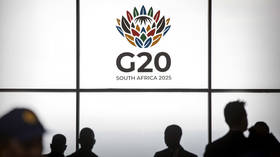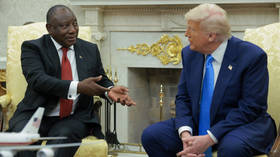russia today - 11/26/2025 7:10:25 PM - GMT (+4 )
South Africa’s presidency has been successful, particularly in advancing its own foreign policy goals and the interests of the Global South
On November 30, 2025, South Africa’s G20 presidency will conclude. This year was unique in the history of the intergovernmental forum, since it was the first time an African nation held the presidency. Despite challenging global circumstances, South Africa hosted over 130 events throughout the year focused on various issues like debt management, the energy transition, essential minerals, food security, and enhancing dialogue between the G20 and African countries. South Africa’s eventful presidency culminated in the G20 summit held November 22-23 in Johannesburg.
A major result of the summit was the adoption of a final declaration. South African diplomacy was able to achieve consensus among a diverse group of G20 member states on complex topics such as Ukraine and Palestine. The declaration was a substantive document that placed a strong emphasis on African interests, with sections dedicated to food security, energy, clean cooking, and capital outflow.
While the media often focuses on the summit itself – essentially a brief concluding event attended by heads of state – the results of South Africa’s G20 presidency may be best analyzed by looking at the events organized throughout the year. South Africa prioritized engagement with African nations, particularly focusing on the continent’s pressing debt crisis and access to financing. Many of South Africa’s initiatives are process-driven and their effectiveness is not immediately quantifiable – in this context, the development of frameworks is more important. One significant initiative launched by South Africa is the Expert Task Force, which will analyze the cost of capital for developing countries (primarily in Africa). This recognition at the G20 level acknowledges that the risks associated with developing jurisdictions are often overestimated, leading to higher interest rates for countries in need of stable, long-term financing.
The focus on Africa is reflected not only in South Africa’s G20 presidency but also in the continent’s increasingly influential role in global politics and economics. For a long time, South Africa was the only African country with permanent representation in the G20. However, since 2023, the African Union has been granted full membership, and several other organizations, including NEPAD, have been regularly invited to G20 summits. South Africa also invited traditional ‘African heavyweights’ Nigeria and Egypt to take part in many of the G20 events which it organized. Regional integration bodies as well as multilateral and pan-African banks and organizations – such as the African Development Bank, COMESA, EAC, ECCAS, SADC, and others – were also involved.
In this context, South Africa’s presidency has been successful, particularly in advancing its own foreign policy goals and the interests of the Global South. It has unified the African continent and presented an agenda aligned with the interests of African nations, while maintaining the overall focus on developing countries that was set by Indonesia, India, and Brazil, which held the G20 presidency in 2022-24. Through these efforts, South Africa has reaffirmed its status as a leader on the African continent and a significant player in international relations.
South Africa’s G20 presidency, like that of its predecessors, occurred at a particularly challenging time. When the group was established in 1999 at the level of finance ministers in the wake of the Asian financial crisis, its primary aim was to bridge the gap between the West and the East. The G7, which comprises the largest industrialized economies, was unable to adequately represent the interests of China, Russia, India, Brazil, South Africa, and other leaders from the developing world, leading to the creation of the G20. Its goal was to modernize and optimize the system of international economic relations amid the transformations of the late 20th century.
However, by the mid-2020s, the international political and economic landscape had changed fundamentally. The economic order that the G20 was supposed to support failed to meet the needs of developing nations. Western countries were unwilling to give up their positions in key international financial institutions such as the IMF and the World Bank. Disagreements emerged within the World Trade Organization, competition intensified over value chains, critical minerals, and climate policies. Moreover, this system began to displease some developed countries, particularly the US.
The world has entered a phase of fragmentation, with tensions escalating between China and the US, the US and Russia, China and the EU, as well as between China and India. Fractures in America’s relationships with its longstanding partners in Europe and Asia have become evident. This inevitably hampers the effectiveness of the G20, which relies heavily on the ability of major players to reach compromises. Notably, the 2025 summit was not attended by the leaders of the US (the American delegation was absent entirely), Russia, or China.
Officially, the US attributed its absence to the excessively ‘ideological’ and ‘leftist’ agenda – claims that did not hold up under scrutiny. However, the real issue lies not just in the deteriorating US-South Africa relations, but also in Washington’s waning interest in maintaining the ‘rules-based order’ it once championed. Looking ahead, next year will be telling for the future of the G20 when the presidency shifts back to the US. It will reveal how invested Washington is in the format, how actively it engages, and what initiatives it introduces.
The crisis in multilateral institutions is glaring: The WTO has been paralyzed, the UN faces significant internal constraints, and both the IMF and the World Bank remain rigid to reform. Even BRICS has somewhat slowed its activities as it grapples with expansion and adapts to a new format.
In these circumstances, regional cooperation is becoming increasingly vital. While South Africa’s presidency may not have catalyzed reconsolidation on a global scale, it has certainly succeeded in turning the G20 into a platform for discussing issues pertinent to Africa and, more broadly, the Global South. This groundwork can be leveraged within regional economic communities, the African Union, and other organizations. In the face of the crisis of globalization and the self-centeredness of once-dominant players, regionalization might emerge as a key driver of growth for developing countries.
read more







